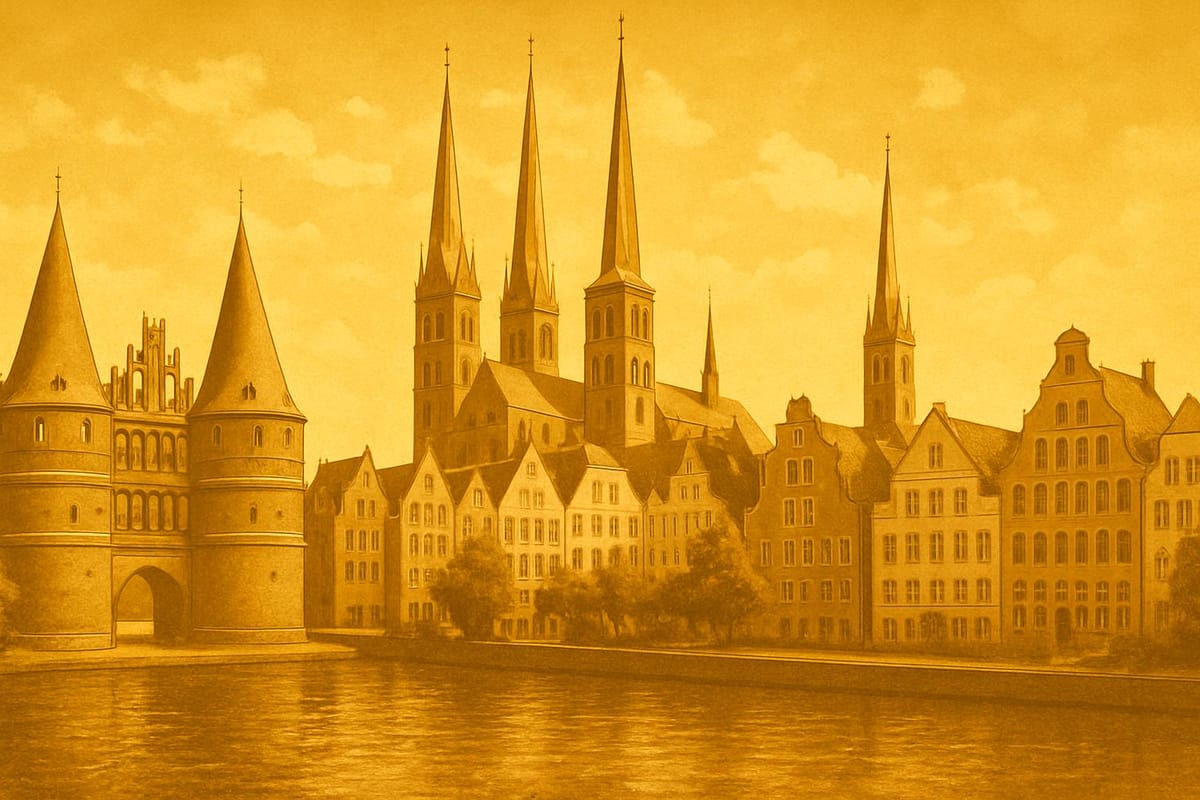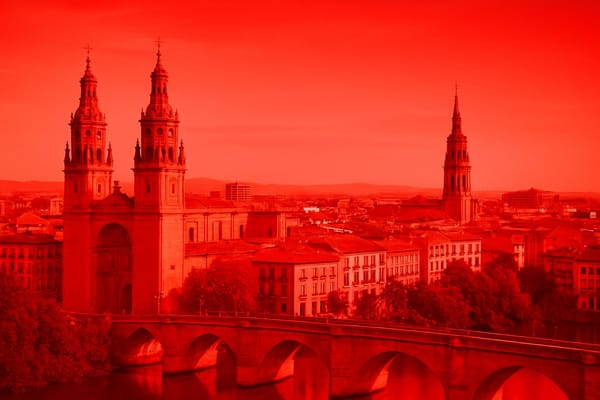Lübeck
Discover a UNESCO World Heritage old town: Brick-Gothic sights, Holstentor, marzipan & harbor.

Important things to know about Lübeck
Lübeck, Germany, is a port city in northern Germany whose identity is shaped by centuries of maritime trade, mercantile tradition and a distinctive urban fabric that blends commercial vitality with a contemplative historic character; positioned near the Baltic Sea, Lübeck evolved as a regional hub where shipping, manufacturing and cultural exchange intersect, and today it continues to combine modern economic sectors-logistics, light industry, education and creative services-with a strong sense of local craftsmanship and culinary heritage, notably marzipan production. The city’s social life and demographic profile reflect its role as both a university town and a center for regional administration, attracting students, small entrepreneurs and families who value a compact urban environment with green corridors, riverine landscapes and pedestrian-friendly quarters. Architectural rhythms of brickwork and narrow streets create a cohesive public realm that supports cafés, markets and cultural institutions, while municipal planning has increasingly emphasized sustainable mobility, waterfront regeneration and the integration of contemporary housing within an established urban grain. Lübeck’s civic identity is also marked by festivals, publishing history and a persistent international orientation rooted in its earlier trade links; this blend of tradition and innovation makes Lübeck an appealing setting for cultural producers, scholars and businesses looking for a strategic northern German location that balances historic continuity with modern amenities, resilient infrastructure and a quality of life defined by accessible services, educational opportunities and a tangible connection to the sea.
Sightseeing hot-spots in Lübeck
Lübeck, Germany, is celebrated for its UNESCO World Heritage Old Town, an island of medieval charm surrounded by the Trave River and canals. Strolling through narrow lanes you encounter the iconic Holstentor, the city’s red-brick gatehouse and emblem, which instantly conveys the rich history of this Hanseatic trading power. Sightseeing in Lübeck reveals a compact concentration of brick Gothic architecture, inviting visitors to explore centuries-old facades, hidden courtyards, and the atmospheric waterfront that once connected Lübeck to the Baltic Sea and international trade routes.
Many of Lübeck’s top attractions revolve around its churches and museums: the soaring spires of St. Mary’s Church dominate the skyline and house fascinating works of art and astronomical clocks, while the Buddenbrookhaus celebrates literary heritage tied to Thomas Mann. For a taste of local culture, the name Marzipan is inseparable from Lübeck, and a visit to a traditional confectioner such as Niederegger reveals the sweet craft that made the city famous. Museums like the European Hansemuseum and the St. Annen Museum give deeper context to Lübeck’s commercial and artistic history, making them essential stops for cultural sightseeing in Lübeck.
Beyond monuments, Lübeck offers lively river promenades, seasonal festivals, and culinary experiences that pair well with historical exploration. Walking tours and boat trips along the Trave River enhance the sense of place, while cozy cafés and seafood restaurants serve up regional flavors after a day of sightseeing. Whether you seek architectural grandeur, maritime legacy, or gastronomic delights, Lübeck, Germany, presents compact and memorable sightseeing highlights that reward both first-time visitors and return travelers alike.
Hotels to enjoy in Lübeck
Lübeck is a charming destination where hotels in Lübeck blend Hanseatic history with modern comfort, offering stays that suit both leisure and business travelers. Many Lübeck hotels are located within walking distance of the Old Town, a UNESCO World Heritage site framed by the shimmering Trave river and dominated by the iconic Holstentor gate. Visitors can choose from elegant boutique properties housed in renovated brick mansions to contemporary city-center hotels that provide easy access to museums, the harbor, and the famous marzipan shops-tasting local marzipan is a must. Whether you prefer a romantic room with views over cobbled streets or a practical, well-equipped base for exploring the Baltic coast, Lübeck’s accommodation scene meets expectations with thoughtful service, Wi‑Fi for business travelers, and cozy touches for couples and families alike.
Picking the right place among Lübeck’s diverse offerings becomes simpler when you focus on location and amenities: prioritize hotels close to the main railway station if you’re arriving by train, or seek riverside stays for scenic walks and easy sightseeing. Many properties advertise family-friendly rooms, breakfast buffets featuring regional specialities, and on-site parking-important for those planning day trips to nearby beaches or Schleswig-Holstein attractions. For visitors comparing options, look for hotels that mention proximity to the city center and historic landmarks, modern conference facilities if traveling for work, and personalized concierge services to book local tours. With careful selection, your stay in Lübeck will balance historic atmosphere and contemporary convenience, making your trip memorable and well-connected.
Restaurants to try in Lübeck
Lübeck, Germany, offers a rich and varied dining scene where Hanseatic tradition meets contemporary creativity. Strolling through the Old Town, a UNESCO World Heritage area, visitors discover charming courtyards, riverside views along the Trave, and an array of restaurants in Lübeck that showcase both regional and international flavors. Seafood is a highlight - fresh Baltic catches and smoked fish appear on many menus alongside hearty local cuisine like pottages and potato specialties. No culinary visit feels complete without tasting Lübeck’s famous marzipan, which pastry chefs incorporate into desserts, cakes, and modern sweet creations that pair beautifully with regional coffee and tea offerings.
The diversity of Lübeck restaurants makes it easy to find the right atmosphere for any occasion, from intimate bistros to polished fine dining establishments and relaxed beer gardens serving craft brews. Many family-run taverns emphasize seasonal, farm-to-table produce while innovative kitchens blend Nordic influences with German comfort food. For travelers seeking authentic experiences, a food-focused walk through market halls or an evening at a riverside terrace reveals why Lübeck’s culinary reputation continues to grow. Whether you search for traditional recipes, contemporary tasting menus, or cozy cafés, the restaurants of Lübeck deliver memorable flavors that reflect the city’s maritime heritage and evolving gastronomic scene.
Best shopping stops in Lübeck
Lübeck’s shopping scene blends medieval charm with modern retail, making shopping in Lübeck a delightful experience for visitors and locals alike. Wander through the Altstadt and you’ll encounter narrow lanes lined with independent boutiques, artisan shops, and cozy cafés that invite leisurely browsing. The city is famous for Niederegger Marzipan, and tasting authentic Marzipan in the historic shop near the Holstentor is a must-do highlight; these flagship stores double as mini-museums where confectionery tradition and craftsmanship are on full display. For those seeking unique homeware, fashion, or gifts, the pedestrian zones along Breite Straße and Hüxstraße offer a mix of high-street brands and local designers, while hidden courtyards reveal antiques and handcrafted jewelry that reflect Lübeck’s Hanseatic heritage.
Beyond boutiques and sweets, the best shopping in Lübeck includes seasonal treasures: the Christmas market transforms the town into a festive shopping destination with stalls selling traditional ornaments, local foods, and handmade goods. Waterfront walks along the Trave lead to markets and pop-up events where regional producers showcase pottery, textiles, and gourmet specialties. Practical information for travelers - from accessible parking near central shopping streets to extended opening hours during holidays - makes planning easy, but the true appeal is the atmosphere: cobbled streets, Gothic brick facades, and the silhouette of the Holstentor create an evocative backdrop for discovering the diverse shopping highlights of Lübeck. Whether you’re hunting for culinary souvenirs, designer finds, or authentic crafts, Lübeck Germany offers a memorable retail journey rooted in history and contemporary style.
Nightlife highlights in Lübeck
Lübeck's nightlife offers a charming mix of historic ambiance and modern entertainment, making Lübeck nightlife a memorable experience for visitors and locals alike. As the sun sets behind the UNESCO-listed Old Town, cobblestone streets and riverside promenades come alive with cozy bars, craft beer pubs and stylish cocktail lounges. Whether you're looking for a relaxed evening on a terrace by the Trave River, a lively student-friendly pub near the university, or a refined wine bar tucked into a medieval alley, Lübeck delivers diverse options that highlight the city's rich culture and seaside heritage. Evenings here are often punctuated by live music, open-mic nights and cultural performances that keep the tempo fresh and inviting.
For those seeking late-night energy, Lübeck also features intimate clubs and venues that host DJs and themed events, blending contemporary beats with local charm. Culinary experiences extend into the night, with taverns and modern restaurants serving regional specialties and late plates that pair well with local beers and cocktails. Strolling past the illuminated Holsten Gate or pausing at a scenic quay offers picture-perfect moments, while friendly locals and a compact city center make bar-hopping easy. Whether planning a weekend getaway or a longer stay, reviewing current event listings and focusing on the Old Town and riverfront areas will help you uncover the best of nightlife in Lübeck, Germany.
Getting around in Lübeck
Lübeck airport and train connections make the Hanseatic city easily reachable for both leisure and business travelers: the small regional Lübeck Airport (Flughafen Lübeck-Blankensee) sits a short drive north of the city center and offers limited scheduled and seasonal services alongside general aviation, while the larger Hamburg Airport is the main international gateway about an hour away by car or train for more flight options; on the rail side Lübeck Hauptbahnhof is well integrated into Germany’s rail network with regular regional trains and long-distance (IC/ICE) services linking Lübeck to Hamburg, Kiel and points further afield, and fast regional connections typically reach Hamburg in under an hour, making public transport and train travel a convenient alternative to flying for many visitors; local buses provide good urban coverage and connections to nearby attractions such as Travemünde, and practical facilities like taxi ranks, car hire and park-and-ride options at the station and airport give travelers flexibility, so planning a trip to Lübeck benefits from checking both airport timetables and train schedules to choose the most efficient route.
Culture must-see's in Lübeck
Lübeck in northern Germany is a treasure trove of Hanseatic history and Brick Gothic architecture that still shapes the city's vibrant cultural life. The Holstentor, with its iconic twin towers, stands as a symbol of Lübeck’s medieval power and welcomes visitors into an Old Town designated a UNESCO World Heritage site. Strolling the narrow lanes reveals landmarks like St. Mary’s Church with its soaring spires and historic astronomical clock, the contemplative Lübeck Cathedral, and intimate literary spaces such as the Buddenbrookhaus, celebrating Thomas Mann’s family legacy. Museums and galleries from the Kunsthalle Lübeck to the Günter Grass-Haus offer rotating exhibitions that connect local traditions to broader European currents, while theaters and concert halls keep classical and contemporary performing arts in constant circulation.
Culinary and festival culture add distinct flavors: Lübeck’s international fame for Niederegger marzipan blends artisan confectionery with centuries-old guild traditions, and seasonal markets-most notably the atmospheric Christmas market-draw crowds to the waterfront. Cultural programming highlights include the long-running Nordische Filmtage (Nordic Film Days) and a lively calendar of concerts, opera and chamber music that reflect the city’s Baltic connections and cosmopolitan past. With its compact Old Town set on islands and waterways, Lübeck offers an accessible cultural itinerary that pairs architectural grandeur, literary heritage and culinary specialties, making it a magnet for travelers seeking the rich, layered identity of Lübeck, Germany.
History of Lübeck
Lübeck, a port city on Germany’s northeastern Baltic coast, grew out of an earlier Slavic settlement known as Liubice and was established as a new urban center in the 12th century. Its strategic position on the waterways leading into the Baltic Sea made Lübeck an early hub for Baltic trade and maritime exchange, and the city quickly rose to prominence as a commercial and political powerhouse. By the 13th century Lübeck had become a founding member and de facto leader of the Hanseatic League, a powerful confederation of merchant cities that dominated northern European trade for centuries. The wealth of those mercantile centuries is still visible today in Lübeck’s skyline: red brick Gothic churches, warehouses, and the iconic Holstentor gate testify to a medieval urban identity shaped by sea-borne commerce, salt and grain exports, and a distinctive legal framework known as Lübeck law, which influenced municipal governance across the Baltic world.
The long arc of Lübeck’s history also reflects resilience and cultural influence. The city’s medieval core survived fires and wars, and after suffering damage in World War II it underwent careful restoration that preserved its historic urban fabric, leading to its recognition as a UNESCO World Heritage site for the exceptional testimony it provides to Hanseatic urban culture. Lübeck’s cultural legacy includes being the birthplace of Thomas Mann, whose novels evoke the moral and social tensions of modern Germany. Today, Lübeck balances tourism and heritage preservation with modern economic life, attracting visitors to its museums, mariners’ quarters, and harborfront while continuing to serve as a regional center in Schleswig-Holstein. From its origins near Liubice to its stature as a symbol of medieval prosperity and civic law, Lübeck’s history offers a compelling narrative of trade, architecture, and cultural continuity that remains central to understanding northern Germany’s past and present.



